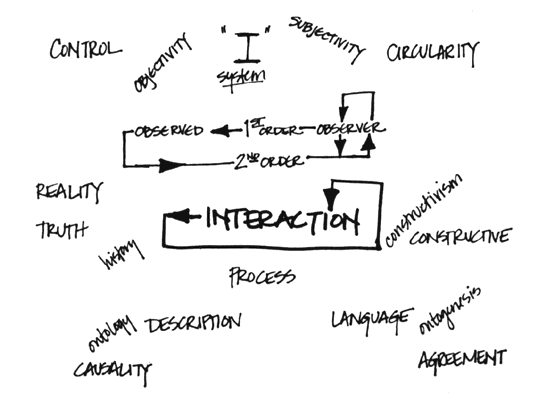|
|
|
INTRODUCTION TO SYSTEM SCIENCE AND CYBERNETICSThe George Washington UniversityManagement 261 Fall 1990 Mondays 4:10 PM to 6:00 PM Dr Paul Pangaro, Instructor [The following text and figure constituted a course description. Although there are implied references to articles that comprised the primary sources for the course, they are not yet listed here by full reference.] 
OBJECTIVES
COURSE REQUIREMENTS
REQUIRED TEXTSItalo Calvino, Mr Palomar, Harcourt Brace Jovanovich, New York, 1985.Other required papers and suggested readings to be assigned on a class-by-class basis during the semester (see notes under Course Requirements, above). COURSE OUTLINEThe following groupings are a starting point and only roughly correspond to individual classes.1. Introduction to an Introduction: Clarifications: Interaction, Process, Description, Observer, "Observed", System. The question, "When is.....?": Relativity and Computation. A proposed Unified Field Theory of Knowing. Applications Taster: domains where systems and cybernetics have been usefully applied (neural networks, management, software design, organizational learning, learning theory, family therapy, biology of living systems, language, machine intelligence). 2. Recognition of "Cybernetics" Its co-opting by other "disciplines". Futurism, robotics, freezing dead people [not really]. Bucky Fuller: organization, tensegrity, synergy. Stafford Beer: Viable Systems Model, organizational design, revising the operation of the country of Chile. Other "Systems Science": Checkland, et al. Ross Ashby: "brain-like" mechanisms, homeostasis, requisite variety. 3. Mathematics, Control, 1st Order Cybernetics G Spencer Brown: Before Numbers and Better than Bertrand Russell (A Calculus of Distinctions). Norbert Wiener: Aiming Artillery, coining Feedback, and the Human Use of Human Beings. Control, the Universal Story of Thermostats, Circularity, and the Attribution of Control (it is what you say it is). Other history: Watt and Governors, Hermeneutics and Religion, the Division of Science and Humanities. 4. Circular Circularity, 2nd Order Cybernetics The Josiah Macy Meetings, Those Grand Old Days with Gregory Bateson, Margaret Mead, John von Neumann, Norbert Wiener and others. Heinz yon Foerster: Computation with Neurons, Observing Systems, Order/Disorder -- Invention/Discovery; Biological Computing. 5. Artificial Intelligence vs Cybernetics Warren McCulloch, Walter Pitts, Alan Turing: the undesired conspiracy that spawned artificial intelligence (AI). "Intelligence in" vs. "intelligence among." Why there is no cognitive "inside". How AI in current forms is doomed to remain artificial. Neural Networks vs Symbolic Processing. 6. Interpretation, Language, Intelligence, Self-Reference Jerome Lettvin: What the Frog's Eye tells the Frog's Brain; Origins of Myth. Humberto Maturana: What is Science? (reality vs. conspiracy); What is it to See? (how theory precedes "discovery"); What is it to Language [sic]? (and do monkeys do it). 7. Living Systems, Scientific Method Maturana with Francisco Varela: Autopoiesis, a new description of the "Living"; Silicon and "Artificial Life". Ranulph Glanville: Black Boxes, Science, and What Can Be Known. Karl Tomm: Family Systems, Interventions (the ethics of control). Distinctions of Self-and-Other (we are what we say). 8. Constructivism: Worlds in Creation Ernst von Glasersfeld: Radical Constructivism and the emergence of the world from consciousness (rather than vice versa). Jean Piaget: Organizing the World by Organizing Our Intelligence (or, how this great psychologist was a cybernetician). Herbert Brun: Performance, Composition, Language, Music (cybernetics "in" art). Gordon Pask: Entrainment and Entertainment (coupling is key). 9. Representing Knowables Foundations of Knowing: Process, Coherence, Distinction. A complete calculus of knowables (get your software development tools ready). Computing the Internal "I" (details of the rise of cognitive organization from within the organism). Agreement over an Understanding (the limits of measuring our sameness). Engines of Agreement (software examples). 10. Conversation and Commitment Interaction, Self-and-Other, the Dance of Agreement (describing living without belittling it). Applications of the Conversational: Management and Organizations (how models make conversations); Groupware (designing and so living through networks); Electronic Mail (slavery and freedom). 11. Ontogenesis, Responsibility, Machine Narcissus Implications for science, culture and government. The "information age" vs. the machine ethos. Reflections. Related Course:
|
|
© Copyright Paul Pangaro 1994 - 2000. All Rights Reserved. |
|